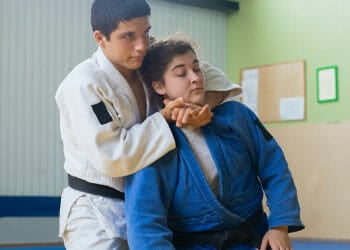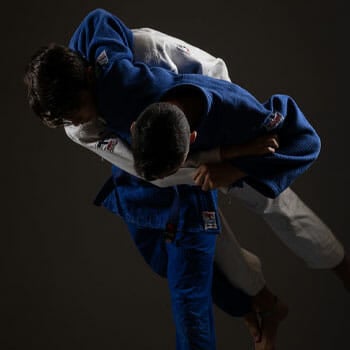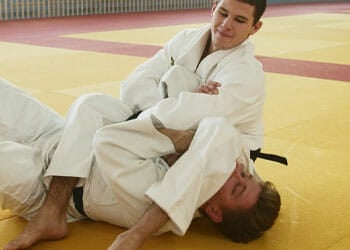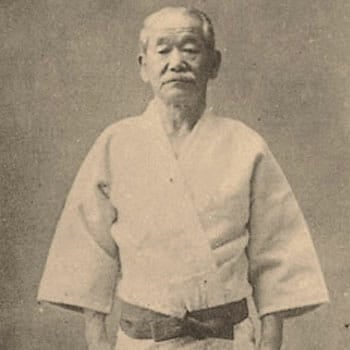I regularly train at the gym with a friend of mine, Donny, who has a black belt in Judo. And despite all the attractions to learn more martial arts styles and maybe become an MMA fighter, he has stuck true to Judo.
He also runs classes for women to learn some basics of Judo for self-defense to help them deal with a dangerous street situation.
But with all the focus these days on flashy fighting styles like Muay Thai, Kickboxing, and Karate, I was curious how well Judo would work to protect yourself against an opponent.
Here’s what I found out.
Quick Summary
- Judo is effective for self-defense, utilizing grappling techniques to control and neutralize opponents without the need for striking.
- The core self-defense techniques in Judo include getting close to the opponent, maintaining balance, effective grappling, and overcoming fear in confrontational situations.
- The substantial popularity of Judo is highlighted by the over 100,000 active members in the United States Judo Association, indicating its effectiveness and widespread appeal.
- In my opinion, Judo's emphasis on technique and strategy over brute force makes it a practical and empowering choice for self-defense.
Judo Self-Defense Techniques

Judo is a form of grappling martial art, much like traditional wrestling is, but it uses very different techniques.
From a self-defense training perspective, it teaches you four things that might be particularly useful in street fights.
Beyond its physical prowess, judo also sharpens the mind, requiring practitioners to develop strategic thinking and heightened awareness of their surroundings, essential skills in any self-defense situation.
As an MMA fighter, I've learned that Judo, while similar to wrestling, offers unique techniques invaluable in street fights.
1. Getting Close

The first thing this self-defense system aims to do is to get you close to your opponent.
The advantage of this is that it completely neutralizes and stops the ability for someone to kick and punch you with any significant force.
That means reading a situation and choosing one or more movements to protect yourself from the blows, and picking your moment to get close.
In my MMA fights, closing the gap quickly has been key to neutralize strikers, a technique I refined through Judo training.
2. Maintaining Balance
During this first phase and the next, Judo is all about teaching you how to maintain your balance.
If you’re going to the ground, then it has to be on your terms with you in full control so that you gain the upper hand.
That’s why so much Judo training involves you learning how to make yourself almost cemented to the ground.
Maintaining balance is crucial in MMA; my Judo experience has been invaluable for staying in control, especially on the ground.
3. Grappling

The next stage of this martial arts self-defense is a combination of using your hands and legs to overpower your opponent.
This may involve flipping your opponent, getting them in a chokehold, or twisting their arms and legs into painful positions to force them into submission.
Judo's grappling techniques, like chokeholds and joint locks, have given me an upper hand in many MMA ground fights.
4. Removing Fear
Finally, there is the whole mental aspect from Judo. All the above techniques help you to build up the mental strength to not be afraid in confrontational self-defense situations.
You’ll have the confidence to trust the techniques you learned, which is a huge life skill.
Judo has bolstered my mental game in the octagon, teaching me to face opponents without fear.
Related Articles:
Judo Advice For Beginners

First of all, if you’re looking to learn ways to show off flying flip kicks like in Muay Thai or Tae Kwon Do, then you’re in the wrong place.
But just like other martial arts, there are a few tips I found for Judo beginners.
- Do plenty of cardio training to build up your fitness levels.
- Learn the etiquette and rules of how Judo classes run.
- Don’t get hung up on earning your belts; those will come with time.
- Get to know other people in the classes and learn from their experiences.
- Take notes after classes about what you learn; belts are awarded on skill and knowledge.
- Enjoy the discipline and physicality.
- Try to enter contests as soon as you’ve learned enough techniques.
History Of Judo

Delving into judo's rich history, founded by Dr. Jigoro Kano in 1882, and its philosophy of 'The gentle way', reveals its emphasis on efficiency and mutual welfare, principles that extend beyond physical combat to personal development.
Understanding Judo's history and 'The gentle way' philosophy has enriched my MMA fighting style with efficiency and strategy.
In 1964, Judo officially became an Olympic sport after unified international rules came into place to allow people from different countries to easily compete against each other.
The International Judo Federation now has representatives from over 200 countries, which shows how popular this sport has become.
While its main aim is to provide a platform for competitive sports, Judo has also been adapted into other disciplines, including MMA and Brazillian Jiu-Jitsu.
“Judo is the way to the most effective use of both physical and spiritual strength. Through training and practicing techniques for offence and defence, one disciplines and cultivates body and spirit, and thereby masters the essence of this way. Thus the ultimate goal of Judo is to strive for personal perfection by means of this and to benefit the world.”
- Kano Jigoro Shihan, Founder of Judo.
These might have a reputation of being street fight styles, but you’ll see many grappling moves from the world of Judo.
It has become a hugely popular sport, and the United States Judo Association has over 100,000 active members [1].
Related Articles:
FAQs
Is Judo or BJJ Better for Self-Defense?
Judo is better for self-defense than BJJ because it focuses much more on balance than BJJ.
Also, BJJ uses most Judo movements as its basis, both in a standing position and on the ground.
Is Judo Better Than Karate?
Judo is better than karate for defending. A Judo fighter can quickly overpower a karate fighter, even if it takes a few heavy blows to get close enough to start grappling.
In a close contact situation, karate kicks and punches are pretty useless.
Is Judo Offensive or Defensive?
Judo is mainly defensive, but you also learn how to turn a situation around with offensive moves.
Learning to deal with a self-defense situation is one thing, but walking away from an opponent, you have to get them into submission.
About The Author
You May Also Like






